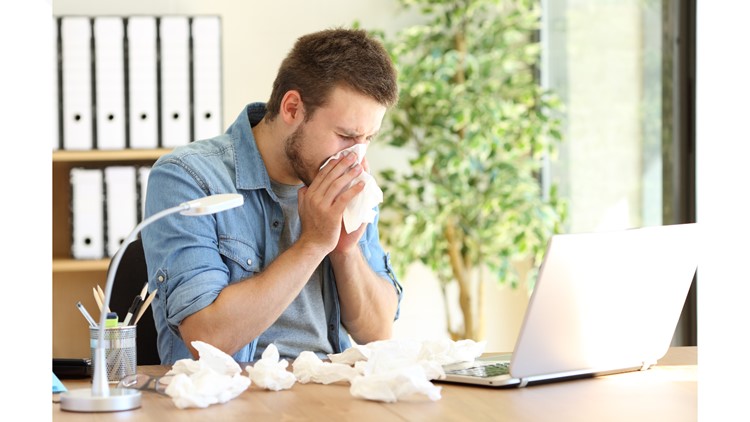DALLAS — With cold and flu season under way, it's likely a number of people in your office will come to work when they should have stayed home.
Staffing firm Accountemps found a whopping 90 percent of employees have come into the office while dealing with cold or flu symptoms. In a survey of 2,800 U.S. workers, one-third of respondents said they never stay home when they’re sick; 57 percent said they sometimes come into the office while ill.
Of 28 U.S. cities, Charlotte, Miami, Austin, Chicago and Cincinnati saw the highest numbers of workers who show up at work sick.
The reason these employees aren’t staying home when they probably should? More than half cited intense workloads. About 40 percent said they don’t want to use sick time. A poll last year found fear of missing out keeps more than one-third of employees from staying home.
Although it might feel more productive to come into the office and power through when sneezing and coughing — “presenteeism” could be at play, too — workers are probably exposing colleagues to germs.
One study discovered going into the office while sick could result in a 40 percent increase in workplace flu cases, per BBC Worklife.
There are millions of cases of the common cold each year in the U.S., resulting in a sore throat, runny nose, coughing and sneezing; symptoms typically last a week to 10 days, per the Centers for Disease Control and Prevention.
Flu season ramps up in October and while activity tends to peak between December and February, it can last until May, per the CDC. Those with the flu are most contagious in the first three to four days of having the virus.
Elevator buttons, escalator railings, door handles, keyboards, conference room phones and coffee cups from the break room tend to be some of the germiest objects in the office. One survey discovered women are better than men at avoiding flu germs at work.
“Bosses should set an example by taking time off when they’re under the weather, encouraging employees to do the same and offering those with minor ailments the ability to work from home,” said Michael Steinitz, senior executive director of Accountemps, a Robert Half company, in a news release.
Millennials — employees ages 25 to 40 — are most likely to come into work while sick; 39 percent said they always do so, Accountemps found.
Among workers ages 18 to 24 and those 55 and older, 27 percent of each age group said they’re always in the office while sick. About one-quarter of 41 to 54 year olds said the same.
Workers in New York, Minneapolis and Miami are more likely to come in while sick due to an overwhelming amount of work.
Staffers in Phoenix, San Diego and Miami, on the other hand, more often cited pressure from their bosses to be in the office despite illness, per Accountemps.
For some workers, it might be difficult to take time off, even when under the weather. The U.S. has no federal laws mandating paid sick leave for workers, per CNBC Make It.
As for state laws, Michigan, Arizona, California, Connecticut, Maryland, Massachusetts, New Jersey, Oregon, Rhode Island, Vermont and Washington are those that require private companies to provide paid sick days, per CNBC Make It.
Trey Barnette, regional vice president at Robert Half (NYSE: RHI), told CNBC Make It more companies now offer onsite flu clinics where workers can get the vaccine, or even wellness clinics to treat sick employees.



